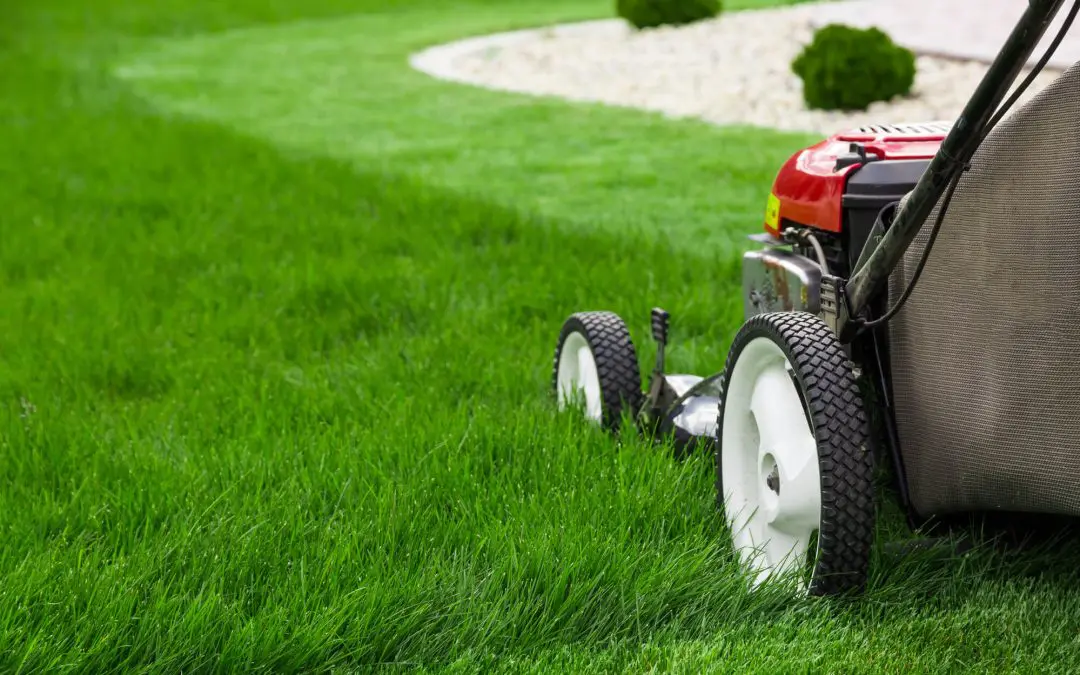A green, healthy lawn in the heat of summer is the result of a few smart habits and a little consistent care. If you’ve ever watched your grass go from vibrant green to crispy brown by July, you’re not alone. Summer lawn care isn’t complicated, but it does need to be intentional. With longer days, hotter temperatures, and unpredictable rain, your lawn will need some backup. Here’s how to help it thrive all summer long.
Start Summer Lawn Care With Smart Mowing
Cutting your grass too short is one of the fastest ways to stress it out, especially during the summer. A short lawn might look tidy, but it actually exposes the soil to more sunlight, dries it out quicker, and weakens the grass roots. That makes it easier for weeds to take over and harder for your lawn to recover from heat or drought.
Instead, keep your mower blade set high. Aim to cut only the top third of the grass blades each time you mow. That helps the lawn stay thick and shaded at the base, which locks in moisture and keeps weeds down. And don’t mow when the lawn is bone dry or heat-stressed—give it a little water first or wait until evening.
Water Deeply and Less Often
It’s easy to assume your lawn needs a daily soak in the summer, but that can actually do more harm than good. Watering too often encourages shallow root growth, which makes grass more vulnerable when temperatures rise.
Instead, aim for deep, infrequent watering. That means letting the water soak down into the root zone—about 6 inches deep. A good rule of thumb is to water once or twice a week, giving your lawn about an inch of water total (including rainfall). Early morning is the best time to water, so less moisture is lost to evaporation.
Feed Your Lawn—But Don’t Overdo It
Fertilizing in summer can be tricky. If you use too much or apply it when the weather’s too hot, it can burn the grass and make things worse. But that doesn’t mean you should skip it altogether.
Use a slow-release fertilizer designed for summer use, and apply it sparingly. If your lawn is already struggling due to heat or drought, it’s better to wait until conditions improve. The goal is to give your grass just enough nutrients to stay healthy without pushing it into overdrive during the hottest months.
Control Weeds Before They Spread
Weeds love weak lawns. When your grass is stressed by heat or mowing too short, it creates an opening for weeds to take over. Summer isn’t the ideal time for aggressive weed control, but you can still spot-treat problem areas.
Stick to targeted weed treatments and avoid blanket applications of herbicide, especially during hot spells. Focus on keeping your lawn thick and healthy—dense grass naturally crowds out weeds and gives you less to deal with later.
Keep Your Mower Blade Sharp
A dull mower blade tears grass instead of cutting it clean. Those torn blades of grass turn brown at the edges, which gives your lawn a dry, patchy look. They’re also more vulnerable to disease and pests.
Sharpen your mower blade a few times throughout the season. You’ll get cleaner cuts, and your lawn will thank you with greener, stronger growth.
Let Grass Clippings Work for You During Summer Lawn Care
It might be tempting to bag and toss those clippings, but leaving them on the lawn is actually good for it. Grass clippings break down quickly and return nutrients to the soil. It’s a simple way to give your lawn a little boost every time you mow.
Just make sure you’re not cutting too much at once. If the clippings are thick and clumpy, rake them up so they don’t smother the grass underneath. Otherwise, let nature do its thing.
A thriving summer lawn is all about doing the right things at the right time. Keep things consistent, don’t overcomplicate it, and your grass will reward you with a lawn you’ll actually want to walk barefoot on.
Summer Lawn Care FAQs
How often should I water my lawn in the summer?
Once or twice a week is usually enough. Water deeply to soak the root zone, and aim for early morning to reduce evaporation.
Can I fertilize my lawn during a drought?
It’s best to hold off. Fertilizer can burn the lawn if it’s already stressed from a lack of water. Wait until conditions improve before feeding.
Why is my lawn turning brown even though I’m watering?
There could be a few reasons: dull mower blades, compacted soil, poor drainage, or watering too often but not deeply enough. It may also be going dormant, which is a natural way grass protects itself during extreme heat.
Should I mow less often in the summer?
Not necessarily. Mow often enough to avoid cutting off too much at once. Just make sure your mower blade is high and sharp.
Is it okay to use weed killer in the summer?
Spot-treating weeds is fine, but avoid heavy applications during hot weather. Focus on keeping your lawn healthy to naturally reduce weed growth.
TMK Inspections offers professional home inspections to homebuyers and sellers in Southeast Pennsylvania. Contact us to request our services.

